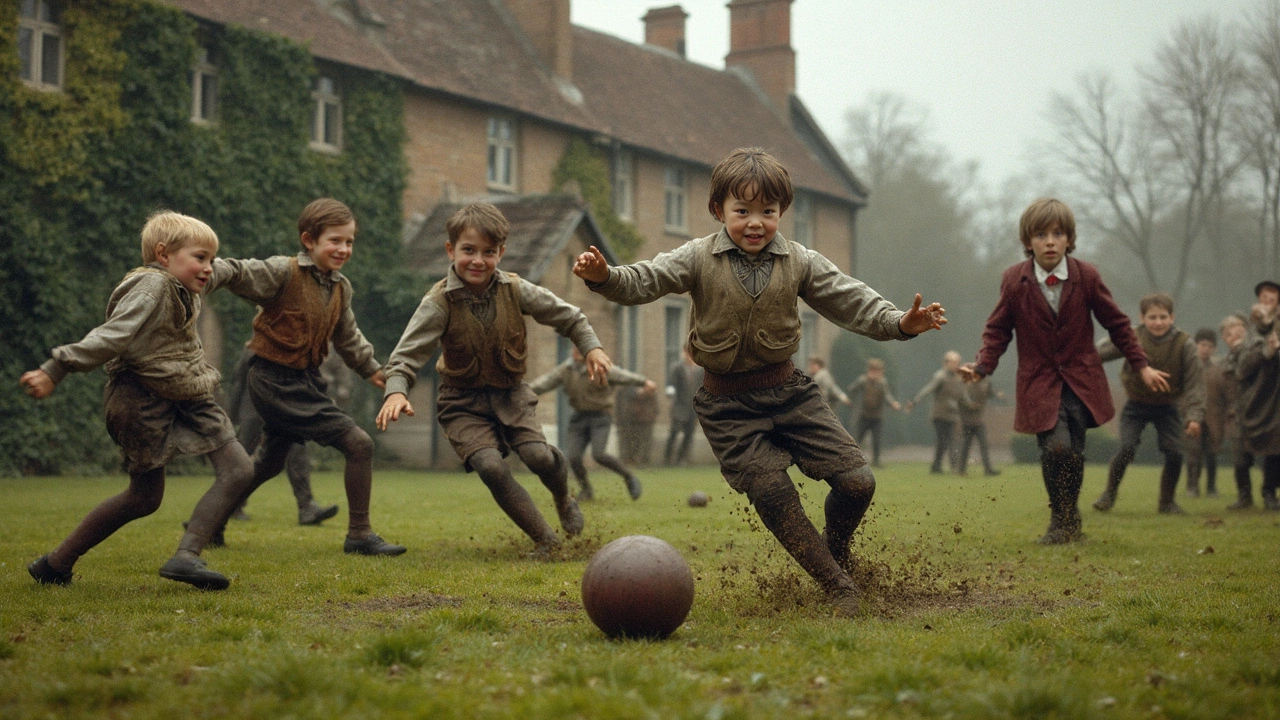The name ‘rugby’ isn’t some fancy invention. It comes straight from a real place—the Rugby School in England. Back in 1823, legend has it that a student at this school, William Webb Ellis, picked up the ball during a football match and ran with it. The teachers were stunned; the students loved it. People started calling this new game "the rugby game" because, well, it was born on the school’s fields. Ever since, the name just stuck.
Most folks don’t realize that rugby and soccer share the same roots. At first, schools played football with all kinds of local rules. But at Rugby School, the running-with-the-ball version was a hit. When students left and took their favorite version with them, the ‘rugby’ style spread. That’s why we don’t just call it ‘football’—rugby was about doing things a bit differently. If you’re the kind of fan who loves knowing the story behind the action, this little twist gives rugby a pretty unique place in sports history.
- The Odd Origin at Rugby School
- How Rules Split into Different Codes
- Rugby’s Journey Across the World
- Staying on Top of Rugby Fixtures
The Odd Origin at Rugby School
The whole story of rugby starts at a small but well-known English school—the Rugby School, founded way back in 1567. Jump ahead to 1823, and you’ve got a teenage student named William Webb Ellis who did something nobody on the football field expected. Instead of kicking the ball, he picked it up and ran, breaking every rule in the book. People still argue about how true this story is, but the simple fact is the game changed right there. That wild move set off a brand-new way to play.
The teachers and students at Rugby School liked having their own style, so the running game stuck around, earning the nickname "the rugby game." Soon, the school wrote down rules for this version, so things didn’t spiral into total chaos. Compared to soccer, rugby had fewer rules about ball handling and allowed tackling, making it a lot rougher and more physical. That caught on fast—other schools started copying, but each one played it a little differently, causing confusion anytime teams met up for matches.
By 1845, three Rugby School students wrote up the first official ‘Laws of Football as Played at Rugby School.' If you want to see the moment when rugby history really took off, it’s right there. That set of laws talked about running with the ball, scoring by touching it down, and even how scrums work. Without those rules, there’d be no fixing matches, no way to decide winners and losers, and no shot at having regular rugby fixtures today.
The original school building is still there in the town of Rugby, and it’s basically a tourist spot for fans who love quirky sports facts. If you ever get to visit, you can even see the playing fields where this legendary story started—proof that sports history sometimes gets made in the most unlikely places.
How Rules Split into Different Codes
Here’s something a lot of new fans don’t know: the reason we have both rugby union and rugby league is because of a big argument over, you guessed it, money. Back in the late 1800s, rugby had gotten popular across England, especially in the north where most players were working guys who could barely afford time off work. Those players wanted compensation if they missed work for games or injuries. But the folks running the game in the south, who had more money and mostly played for fun, insisted on keeping rugby strictly amateur—no pay, just for pride.
The tension came to a head in 1895. A bunch of northern clubs broke away and formed their own league, the Northern Rugby Football Union. This group eventually became known as rugby league. The original version, now called rugby union, stuck with amateur rules for another century. The rules gradually split from there: rugby league simplified things—thirteen players, no line-outs or mauls, and a focus on speed and attacking play; rugby union kept fifteen per side, more contested physical play, and different scoring.
Rugby fixtures for both codes look similar to a beginner, but the games are quite different when you watch. A full rugby union match lasts 80 minutes, while league games go for 80 minutes too but with slightly different pacing and structure. Even scoring is different. In union, a try is worth five points, while in league, it’s only four.
| Key Differences | Rugby Union | Rugby League |
|---|---|---|
| Players per team | 15 | 13 |
| Try points | 5 | 4 |
| Line-outs | Yes | No |
| Tackles before turnover | No limit | 6 |
So whenever you’re checking rugby fixtures, always look for union or league. The code makes a huge difference in how the match is played and enjoyed. If you want complex scrums and set pieces, go for union. If you prefer faster play and more runs, league is your game. Either way, now you know why there’s more than one ‘rugby’ in the world.

Rugby’s Journey Across the World
Rugby didn’t just stay a local game played behind English school gates. By the late 1800s, it was riding the coattails of the British Empire, popping up everywhere the British went. This is how you get a world where New Zealand and South Africa care about rugby just as much as England—sometimes even more.
Let’s get concrete. New Zealand caught on fast: by 1870, the first match was played in Nelson. Today, the All Blacks (New Zealand's national team) are world-famous for their intimidating haka dance and record-breaking wins. South Africa joined the scene in 1862, eventually building the kind of passionate fandom that turns fixtures into national events. Australia picked up rugby in 1864, leading them to become one of the fiercest rivals on the pitch.
By the early 1900s, official rugby fixtures were happening in almost every corner of the British Empire—from France to Fiji, Scotland to Japan. The game split into two codes in 1895: rugby union and rugby league. This split was mostly about working-class players wanting to be paid for time off work, which the older, more traditional clubs didn’t like at all.
Here’s a quick look at how the sport spread, and where the action is strongest today:
| Country | First Official Game | Current Popularity |
|---|---|---|
| New Zealand | 1870 | National sport |
| South Africa | 1862 | Extremely popular |
| France | 1872 | Top European following |
| Japan | 1899 | Growing fast |
Want to feel like a local? Learn a country’s rugby fixtures calendar and favorite teams. It’s the fastest way to get welcomed at a pub from London to Cape Town. Plus, you’ll have a reason to pay attention when people start talking about the next World Cup, Super Rugby, or Six Nations.
Staying on Top of Rugby Fixtures
Keeping up with rugby fixtures can get tricky—especially in a season packed with internationals, league games, and cups. If you want to know when your team’s playing or just plan ahead so you don’t miss the best clashes, here’s how to make it easier.
Most major rugby unions, like England’s Premiership Rugby or Super Rugby Pacific, post their full schedules months in advance. Teams usually share their fixture lists on official websites, so you’ll find dates, venues, kick-off times, and sometimes even live stream info. Bookmarking these sources means you’re less likely to miss a match, especially when start times get shifted.
If you’re really into rugby, subscribing to your team’s newsletter or following their social media pays off. Updates usually land straight in your inbox or feed, covering everything from fixture changes to ticket sales. There are also sports apps—like the Ultimate Rugby app or the World Rugby Match Centre—that push notifications, showing fixtures across leagues plus live scores and stats.
- Check club websites at the start of the season for detailed fixture lists.
- Set calendar reminders for key rugby fixtures.
- Use sports apps for real-time alerts on schedule changes and scores.
For the big tournaments, like the Six Nations or the Rugby World Cup, keeping an eye on the official tournament sites is a smart move. They usually post easy-to-read calendars and interactive tables that show results, standings, and upcoming matches.
| App/Website | What It Offers |
|---|---|
| Ultimate Rugby | Fixtures, live scores, player stats |
| World Rugby Match Centre | All major tournament schedules |
| Premiership Rugby | Full UK league fixtures & news |
Rugby fans like to say you have to show up or tune in to really feel the action. With all the tools now, you’ve really got no excuse to miss a game—unless you’re caught in extra time at work, which, let’s be honest, happens to the best of us.
